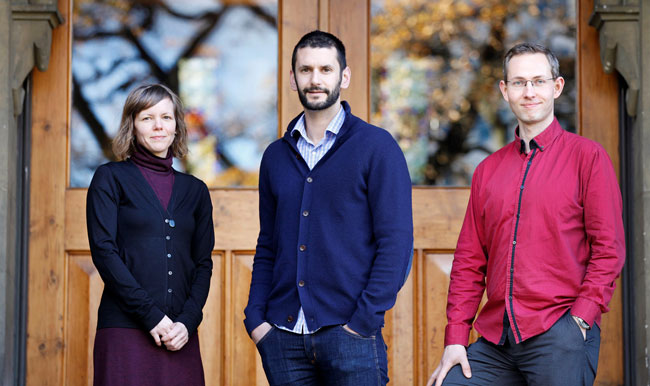
The Dunedin-based recipients of Early Career Awards for Distinction in Research (from left) Dr Sheri Johnson of Zoology, Dr Karl Iremonger of Physiology and Dr Jörg Hennig of Mathematics & Statistics. Photo: Sharron Bennett.
The outstanding contributions of five up-and-coming University of Otago academics have been recognised through Early Career Awards for Distinction in Research.
Dr Anitra Carr (Pathology, Christchurch), Dr Jörg Hennig (Mathematics & Statistics), Dr Karl Iremonger (Physiology), Dr Sheri Johnson (Zoology) and Dr Logan Walker (Pathology, Christchurch) have been selected for the award on the basis of their outstanding research achievements.
Their research spans diverse topics including the role of micronutrients in human health and disease, the field of general relativity, the effect of chronic stress on the brain, genetic and environmental effects on behaviour and reproduction, and genetic factors underlying breast cancer.
Announcing this year's recipients, University of Otago Deputy Vice-Chancellor (Research & Enterprise) Professor Richard Blaikie warmly congratulated the five researchers, saying their impressive records are a reflection of the calibre of research being undertaken at Otago.
“Even at this early stage in their careers, these accomplished researchers are making remarkable contributions in their respective fields and within the University. Such achievements mean they are well positioned to be among Otago's future research leaders,” Professor Blaikie says.
About the recipients:
Dr Anitra Carr - a Senior Research Fellow and Centre Co-ordinator for the Centre for Free Radical Research, Department of Pathology, Christchurch campus. Dr Carr is currently researching the role of vitamin C in acute and chronic disease, such as cancer, and recently obtained a Freemasons Carrell-Espiner Research Fellowship to begin research into the role of vitamin C in severe infection and sepsis, the major cause of mortality in critically ill patients.
“I was really surprised and pleased to receive this award. As a working mother who has had to take time out from research to raise children, I appreciate still being considered eligible for this early career award.”
Dr Jörg Hennig - a Lecturer in the Department of Mathematics and Statistics. Dr Hennig's research is concerned with cosmological models, properties of black holes and the application of highly-accurate numerical methods to problems in general relativity.
“It was a pleasant surprise to receive this award. I am grateful and I feel truly honoured that my research is recognised in this way.”
Dr Sheri Johnson - a Lecturer in the Department of Zoology. Dr Johnson's research examines the effects of age on fertility traits in zebrafish and humans. She has broad interests in ecology, evolution and behaviour.
“I feel proud to receive the award and am looking forward to becoming part of the O-Zone group. The timing of the award is also quite good as I have several grant and fellowship proposals that will soon be under review, so hopefully this award will reinforce my ability to achieve and deliver on this new line of research.”
Dr Logan Walker - a Senior Research Fellow in the Department of Pathology at the Christchurch campus. Dr Walker's research aims to evaluate the clinical significance of genetic variants associated with cancer risk and development.
“I can say that I am very appreciative of the award. It will be used to strengthen my links with national and international collaborators so that my research can continue to help high-risk cancer families.”Dr Karl Iremonger- a Lecturer in the Department of Physiology. Dr Iremonger is a Principle Investigator in the Centre for Neuroendocrinology and the Brain Health Research Centre. He currently runs an independent research programme focused on understanding how brain cells control the body's response to stress.
The Early Career Awards for Distinction in Research were introduced in 2004 to recognise and nurture the University's most promising early career researchers. Each recipient will receive $5000 to support their research and scholarly development.
Recipients also become members of the University's O-Zone Group of early-to-mid-career researchers. O-Zone undertakes activities to promote interdisciplinary thinking and collaborations and to present a positive, clear, innovative, and independent voice for research within the University and beyond.